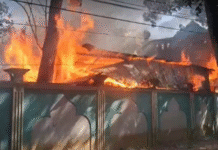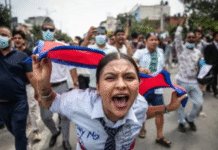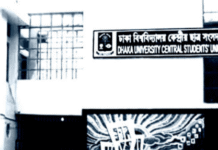The foreign diplomats and UN officials, who were taken on a tour to conflict-ridden Rakhine State on Monday, want Myanmar to move quickly for voluntary, dignified and safe return of the Rohingyas who fled violence to Bangladesh.
Building on the trip, the first since violence erupted late August, they look forward to strengthening trust and cooperation with all communities and Myanmar government.
“This will be critical in addressing the root causes and setting a sustainable path towards peace and prosperity for all people in Rakhine State, irrespective of ethnicity, religion or citizenship status,” said Farhan Haq, deputy spokesman for the un secretary-general, at a press briefing in Geneva on Monday.
According to the UN, over 5,09,000 Rohingyas crossed to Bangladesh until September 30 fleeing Myanmar army crackdown launched in response to insurgent attacks on police posts and an army base on August 25.
The Human Rights Watch said more than 200 Rohingya villages were burned down, hundreds of Rohingya men killed and women raped.
Rights bodies termed the atrocity “crimes against humanity”, while the UN denounced it as a “textbook example of ethnic cleansing”.
Blocking access of humanitarian organisations, diplomats and journalists to Rakhine State also brought widespread criticism. Myanmar authorities had cancelled a planned trip of the diplomats and UN officials to Maungdaw Township on September 28.
Monday’s trip is seen by the diplomats as a positive step.
“Our colleagues in Myanmar believe it could help in our efforts to explore how the UN could cooperate with the Myanmar authorities to alleviate the dire situation in northern Rakhine,” Farhan Huq told reporters.
WHAT THEY SAW IN RAKHINE
The diplomats in a statement said they went to a number of villages in Maungdaw and Rathedaung and met a mixture of local communities. Many people of all communities in northern Rakhine have suffered and still feel great insecurity.
“We saw villages which had been burned to the ground and emptied of inhabitants. The violence must stop. The security forces have an obligation to protect all people in Rakhine without discrimination and to take measures to prevent acts of arson,” says a statement.
Twenty foreign diplomats from the US, the UK, France, European Union, Turkey, Australia, Canada, New Zealand, Denmark, Indonesia, Czech Republic, Italy, Netherlands, Norway, Serbia, Switzerland, Germany, Spain, Sweden and Finland issued the statement.
UN Resident Coordinator Renata Lok-Dessallien in Myanmar, World Food Programme Representative and Deputy Humanitarian Coordinator Domenico Scalpelli and senior UNHCR official Cécile Fradot were also in the tour.
UN officials did not issue any statement, but UN Secretary-General’s Deputy Spokesman Farhan Haq briefed reporters in Geneva on the visit.
The diplomats said they saw dire humanitarian need of people in Rakhine.
“We call once more for unimpeded humanitarian access to northern Rakhine and resumption of life-saving services without discrimination throughout the state,” the statement read.
They emphasised that the people must not be subject to, and should be protected from, any reprisals, such as physical attacks or arbitrary arrest.
They also called on Myanmar authorities to fully investigate allegations of human rights violations, prosecute those responsible, and allow the UN Fact-Finding Mission to visit Rakhine.
INFLUX CONTINUES
Meanwhile, more than 10,000 Rohingyas have massed in Myanmar near a crossing point into Bangladesh, Myanmar media said yesterday, apparently poised to join an exodus across the border due to food shortages and fear of attacks in their homeland.
They have arrived “between Letphwekya and Kwunthpin village to emigrate to the neighbouring country”, the state-backed Global New Light of Myanmar newspaper reported.
After a brief lull in arrivals, the Bangladesh Border Guard says, 4-5,000 Rohingya are now crossing each day.
“They don’t want to stay [in Myanmar]. They want to come here… they are being told to leave,” Lieutenant-Colonel SM Ariful Islam told AFP.
UNHCR OPENS DIARRHOEA TREATMENT CENTRE
UNHCR, in cooperation with Bangladesh public health authorities, opened a 20-bed diarrhoea treatment centre on Monday in Kutupalong refugee camp.
It is working to arrange 80 beds by the end of this week in three locations as cases of diarrhoea see an increasing trend amid lack of sanitary latrines and clean drinking water.
UNHCR this week also plans to open medical consultation centres with attached oral rehydration “corners” throughout the huge Kutupalong Extension Site where many of the refugees have arrived since August 25.
“This is a move to bring medical care closer to those in need,” said a UNHCR statement.
To speed up delivery of aid, UNHCR in collaboration with Refugee Relief and Repatriation Commission (RRRC) will begin a family count to collect data on newly-arrived refugees and their needs.
Each family will receive a card bearing the RRRC logo, which will enable the government, UNHCR and other agencies to target aid to the right people, including pregnant and lactating women, people with disabilities or elderly people.
60% OF THEM CHILDREN
Sixty percent of the Rohingyas, who have fled Myanmar to Bangladesh since August 25, are children under 18, including hundreds without family members, says Save the Children.
They need extra support to ensure their emotional wellbeing and also to avert the risks they are exposed to, according to a press release of the global charity, reports UNB.
Many of the unaccompanied children are highly distressed or traumatised as they have been through a dreadful experience while fleeing Myanmar and travelling long distances to Bangladesh through rain and mud.
Many became orphans when their parents were killed, often in front of their own eyes. These children are the most vulnerable and at high risk of trafficking, child labour, sexual abuse and other threats, said Save the Children.
UK, IOM ARRANGE AIRLIFT
The UK, in collaboration with the UN Migration Agency, has organised a major airlift of relief items for the newly arrived Rohingyas.
The aid, flown into Chittagong by the UK’s DFID on September 28 and 29, included 20,000 blankets, 10,500 sleeping mats, and 10,000 shelter kits. Each shelter kit contains two tarpaulins and the rope necessary to fix them.
“This airlift will supply 10,000 families — 50,000 people — with potentially life-saving shelter, mats and bedding to protect them during the monsoon season’s torrential wind and rain,” said Mohammed Abdiker, IOM Director of Operations and Emergencies.
Source: The Daily Star









